外研版英语初一下册知识总结家有初一学生的朋友注意了
最近因为课时规划,刚好在做下册知识总结,分享给有需要的学生们,假期除了适当娱乐休息,也是充电提升自我的好机会哦!加油!
外研版英语初一下册语法知识总结
一、物主代词
1、代词概念:
代指名词的一类词。英语中代词分为:人称代词、物主代词、反身代词、指示代词、关系代词、疑问代词、连接代词和不定代词等。
2、物主代词概念:
说明事物所属关系的代词,分为形容词性和名词性两种。
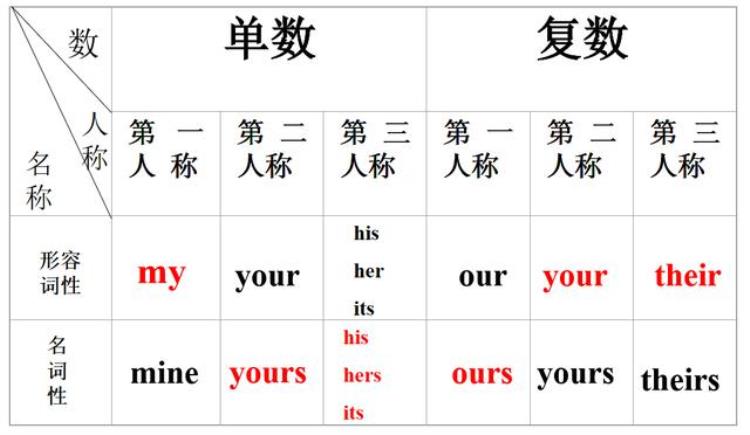
3、形容性物主代词
形容词性物主代词在句子中作定语修饰名词,一般不单独使用。
His parents are very kind.My name is Ella.
4、名词性物主代词
名词性物主代词常用来避免和前面已经提及的名词重复。相当于"形容词性物主代词 名词"。
My idea is quite different from hers.
5、形容词物主代词与名词性物主代词相联系
名词性物主代词 =形容词性物主代词 n.
These books aren't ours. Ours are new. (our books = ours)This is not our room. Ours is over there. (our room = ours)1).形容词性物主代词后面一定要接名词(作定语)(my books )
2).名词性物主代词后面不能接名词,(作主语,宾语等)mine books ×
3)***双重属格要用名词性物主代词,例如:a friend of mine
"of 名词性物主代词"表示所属,作定语时放在名词后面
A sister of his is a nurse. 他的一个妹妹是个护士。
6、易错点
区分名词性物主代词和形容性物主代词
名词性物主代词在句中所指代的关系是单数还是复数。
7、练习
用形容词性物主代词和名词性物主代词填空
①I ate all ____ sandwiches yesterday.( I )
Can I have one of ____ ? ( you )
②. George has lost ____ ( his ) pen.
Ask Mary if(是否)she will lend him ____ . ( she )
③.Jack has a dog and so have I.
____(he)dog and ____( I ) had a fight (打架).
④The teacher wants you to return that book of ____ ( he )
⑤Mr. and Mrs. Green and a friend of ____ are coming to see us. ( they )
⑥ We are going to Paris to stay with a French friend of ____ . (we )
⑦ This isn't ________knife. _________ is green. ( she )
⑧These are your books Kate.
Put ________in the desk,please.(they )
⑨ _______ must look after ________ things. ( you )
⑩Wei Fang,is that ________ ruler? Yes,it's.( you )
答案:1、my yours 2、his hers 3、his mine 4、his 5、them 6、ours 7、her her 8、them 9、you your 10、your
二、情态动词
1、概念
情态动词表示人的主观愿望,本身有一定的词义,但是不能独立作谓语,只能和动词原形一起构成谓语。情态动词主要有下列:can (could), may (might), must, need, ought to, shall (should), will (would)
另外情态动词没有人称和数的变化,情态动词后必须跟动词原形。
2、情态动词can具体用法
(1)表示"能、会",指脑力或体力方面的"能力"。
例如:
I can speak English.我会讲英语。
Jim can swim but I can't.吉姆会游泳,但我不会。
(2)表示"可能",常用于否定句或疑问句中,指某种可能性或揣测,此时can't 译为" 不可能"。
例如:
Han Mei can't be in the classroom.韩梅不可能在教室里。
Can he come here today, please?请问他今天能到这里来吗?
3.表示"可以",常用于口语中,指许可或请求做某事,可以代替may。
例如:
Can I have a cup of tea, please?请问我可以喝一杯茶吗?
You can go out.你可以出去了。
4、补充:can的过去式could,意为"能、会",表示过去的能力
如:He could write poems when he was 10.他十岁时就会写诗。
could在疑问句中,表示委婉的语气,此时could没有过去式的意思。如:Could you do me a favor?你能帮我个忙吗?
—Could I use your pen?我能用一下你的钢笔吗?
—Yes, you can.可以。(注意回答)
5、情态动词can的基本句型:
(1).肯定句型为:主语 can 动词原形 其它。
例如:They can play basketball.他们能打篮球。
She can dance.她会跳舞。
(2)否定句型为:主语 can not(can't/cannot) 动词原形 其它。
表示"某人不能(不会。不可能)做……"。其中can't是can not的缩略式,英国多写成cannot。例如:
You cannot pass the ball like this.你不能像这样传球。
I can't ride a motorbike.我不会骑摩托车。
(3)疑问句句型分为:一般疑问句句型和特殊疑问句句型两种类型。
⑴一般疑问句句型为:Can 主语 动词原形 其它。表示"某人会(能。可以)做……吗?",用于口语时,常表示请求或许可。
其肯定答语用""Yes,主语 can."作答;否定答语用"No,主语 can't."作答。
注意答语中做主语的人称代词,应根据问句中的主语作相应的变化。其变化规则为:第一人称问,则第二人称答;第二人称问,则第一人称答;第三人称问,第三人称答。
例如:
①-Can you sing an English song for us?
你可以为我们大家唱一首英语歌吗?
-Yes.行。(注意在Yes后面常省略I can)
②-Can I skate?我可以滑冰吗?-Yes, you can.可以。
③-Can she climb hills?她能爬山吗?-No, she can't.不,她不能。
⑵特殊疑问句句型为:
① Who can 动词原形 其它。该句型中who相当于主语。
例如:
-Who can sing in English in your class?你们班上谁会用英语唱歌?
-Lily can. 莉莉会。
②特殊疑问词(作定语) 名词 can 主语 动词原形 其它。
该句型中的特殊疑问词常用how many, how much等。
例如:
-How many boats can you see in the river?
你能看见河中有多少只船吗?
-Only one boat. 仅有一只。
③特殊疑问词 can 主语 动词原形 其它。该句型中的特殊疑问词常用what, where, when等,一般用肯定陈述句作答。
例如:
-What can you see in the picture?你能在图画中看到什么?
-I can see some birds and two big trees in it.
我能看到一些鸟儿和两棵大树。
6、练习
(1)My elder brother ______________(能) drive a car.
否定句:
一般疑问句:
肯定回答:
否定回答:
就划线部分提问:
(2)①.---Can I go fishing with you, Dad?
---No, you _____.You ______stay at home and do your homework first.
A. won't; may B. can't must C. shouldn't; ought D. needn't;should
2. ---Do you know whose dictionary it is?
---It ______ be Li Mei's. Her name isn't on it.
A. can't B. mustn't C. shouldn't D. needn't
3. ---I can't stop smoking, doctor.
---For your health, I'm afraid you ______.
A. can B. can't C. must D. mustn't
答案:(1)can、否定句:My elder brother can't drive a car、肯定回答:Yes,he can、否定回答:No,he can't、一般疑问句:Can your elder brother drive a car?、划线部分提问:What can your elder brother do?
(2) BACAD
三、一般将来时
1、概念
一般将来时表示将来某个时间要发生的动作,事情或存在的状态,也表示将来经常或反复发生的动作或事情。
2、常见结构
(1)"be going to 动词原形"结构
表示按照主观意图打算或按计划,安排将要做的事,有"打算、就要"的意思。也常用于表示从迹象上表明将要发生的事情,多指个人主观臆断的推测。
如:Look at the clouds. It's going to rain. 看这些云,要下雨了。
(2)"shall或will 动词原形"结构
指对将来事物近期或远期的预见,表达个人主观意图以及征求对方意见或表示客气的邀请。在书面语中,shall多用于第一人称;在口语中,will可以用于任何人称。
如:I shall/will show my photos to you next Monday.
我下周一给你看我的照片。
3、一般将来时的句式:
(1)肯定句:
①主语 be(am,is,are) going to 动词原形 ......
②主语 will/shall 动词原形 .....
They are going to play football this afternoon.
Our teacher will come back very soon.
2.否定句:
(1)..主语 be(am, is, are) not going to 动词原形 ......
例如:
① I am not going to play basketball tomorrow. 明天我不将踢足球.
② She is not/isn't going to visit Shanghai next year. 明年她不将参观上海.
(2)..主语 will/shall not 动词原形 .....
①I shall not go to school the day after tomorrow。后天我不将上学了
②I will not write my homework this evening.(will notl=I won't)
今晚我不将写作业
③She will not see a movie next week.(will not=won't)
下个星期她将不看一场电影.
(3)一般疑问句:
①Am/Is, Are 主语 going to 动词原形 ....
--Am I going to see my grandfather tomorrow?
明天我将去看我的爷爷吗?
--Yes, you are. 是的,你将去.
-- Are you going to listening to the tape tomorrow?
明天你将听录音带吗?
---No, I am not.不,我不将.
--Is she going to Beijing next year? 明年我将去北京吗?
--Yes, she is. 是的,她将.
②.Will//shall 主语 动词原形 ...
--Shall we play volleyball next class? 下一节课我们将打排球吗?
--Yes, you will. 是的,你们将.
--Will you come here next week? 下个星期你将来这儿吗?
--Yes, I will. 是的,我将.
--Will she teach us this term? 这学期,她将教我们吗?
--Yes, she will. 是的,她将.
(4)特殊疑问句:
①.What(Where,How...) be(am,is,are) 主语 going to 动词原形 ...?
--What are you going to do tomorrow? 明天你将要做什么?
--I'm going to the park? 我将要去动物园.
--Where are you going to swim? 你将要去哪儿游泳?
--I'm going to swim in the river.
② What(When,Where,How...) will 主语 动词原形 ...?
---What will you do next week? 下个星期你将要做什么?
---I will do my homework。 我将要做作业.
--How will she come here tomorrow? 明天她将要怎么来这儿?
--She will come here by bus。 她将要乘公共汽车来这儿.
4、练习,单选题:
( )① There __________ a meeting tomorrow afternoon.
A. will be going to B. will going to be
C. is going to be D. will go to be
( )② Charlie ________ here next month.
A. isn't working B. doesn't working
C. isn't going to working D. won't work
( )③ He ________ very busy this week, he ________ free next week.
A. will be; is B. is; is
C. will be; will be D. is; will be
( )④. There ________ a dolphin show in the zoo tomorrow evening.
A. was B. is going to have
C. will have D. is going to be
( )⑤–________ you ________ free tomorrow?
– No. I ________ free the day after tomorrow.
A. Are; going to; will B. Are; going to be; will
C. Are; going to; will be D. Are; going to be; will be
( )⑥ Mother ________ me a nice present on my next birthday.
A. will gives B. will give C. gives D. give
( )⑦. – Shall I buy a cup of tea for you?
–________. (不,不要。)
A. No, you won't. B. No, you aren't.
C. No, please don't. D. No, please.
( )⑧ – Where is the morning paper?
– I ________ if for you at once.
A. get B. am getting C. to get D. will get
( )⑨. ________ a concert next Saturday?
A. There will be B. Will there be
C. There can be D. There are
( )⑩ If they come, we ________ a meeting.
A. have B. will have C. had D. would have
答案:C D D D D B C D B B
四、特殊疑问句
1、概念
特殊疑问句是在英语中以特殊疑问词开头,对句中某一成分提问的句子,属于疑问句的一种。常用的疑问词有(特殊疑问词):what 、who 、whose 、which 、when 、where 、how 、why等。
回答特殊疑问句时不能用yes / no,即问什么答什么。
2、常用引导词和短语
疑问代词:
what(什么) who(谁,作主语)
which(哪个,在一定范围内选择) whose(谁的,指附属关系)
疑问副词:
when(何时,询问时间) where(何地,询问地点)
why(为什么,询问原因)
how(如何,询问手段,方式,工具以及程度)
What构成的特殊疑问短语
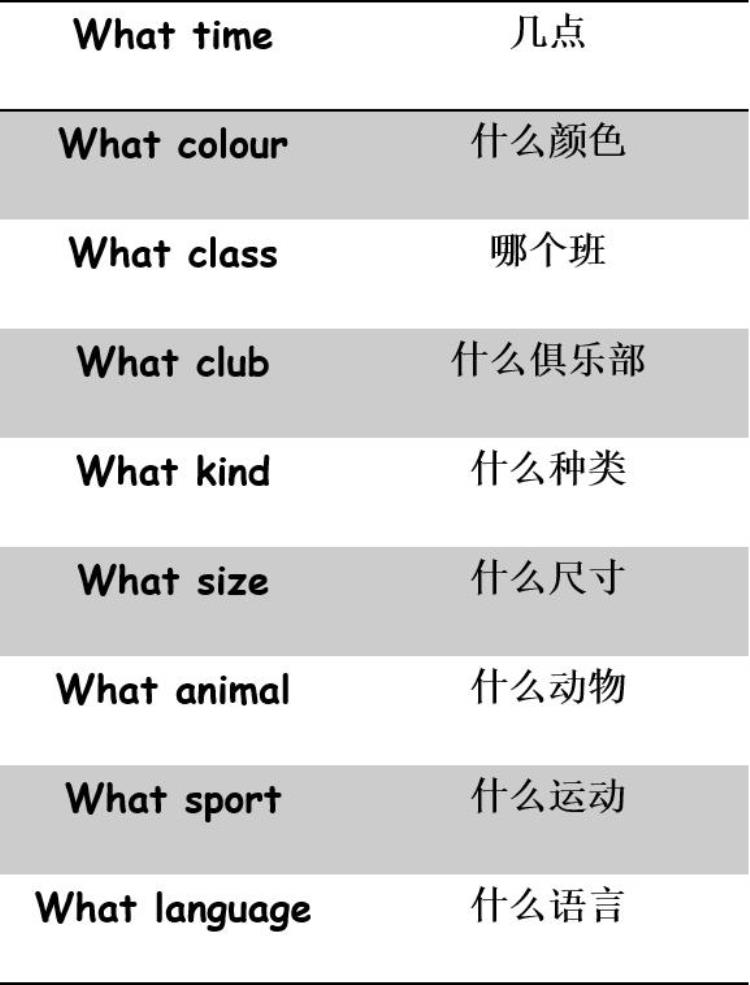
How构成的特殊疑问短语
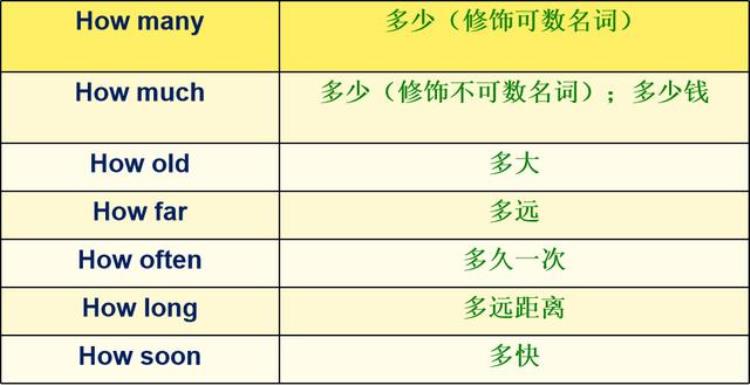
3、基本结构
(1)特殊疑问词 情态动词 主语 实义动词 其他 ?
What can I do for you today?
(2)特殊疑问词 谓语动词(组合) 主语 其他?
What is your name, please?
(3)特殊疑问词(主语) 助动词 实义动词 其他?
Who will go to Guangzhou with the manager by plane tomorrow?
What has been offered to the poor homeless children for the coming winter?
(4)特殊疑问词(主语) 谓语动词(组合) 其他?
Who is the man under the big tree?
What must be finished first before we go to picnic two days later?
4、练习,用方框所给词填空:
who,which,where,what,whose,how old,why,how,when,how much,how far,how many,what time
①A: ___________________________ is it? B: It's half past six.
②A: ___________________________ is Mary from? B: America.
③A: ___________________________ is your school from here?
B: 5 kilometers.
④A: ___________________________ is that girl?
B: She's my classmate, Linda.
⑤A: ___________________________ are you? B: Fine, thanks.
⑥A: ___________________________ pencils do you have? B: I have three.
⑦A: ___________________________ ball is this? B: It's Peter's.
⑧A: ___________________________ boy is Billy? B: That fat boy.
⑨A: ___________________________ don't you like mice?
B: They are too dirty.
⑩A: ___________________________ is your brother? B: He's ten.
答案:1.What time 2.Where 3.How far 4.Who 5.How 6.How many 7.Whose 8.Whose 9.Why 10.How old
五、方位的表达方式
本模块需要注意的是方位介词的使用和问路与指路的表达方式
1、方位介词
表示方位的介词通常有以下这些:
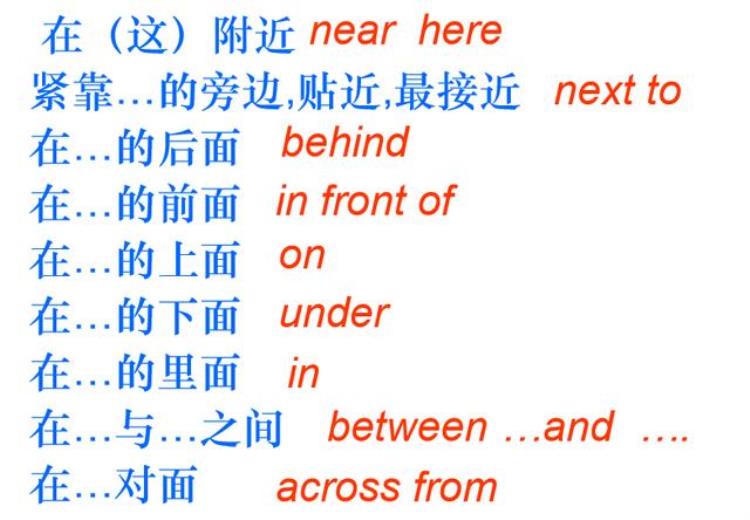
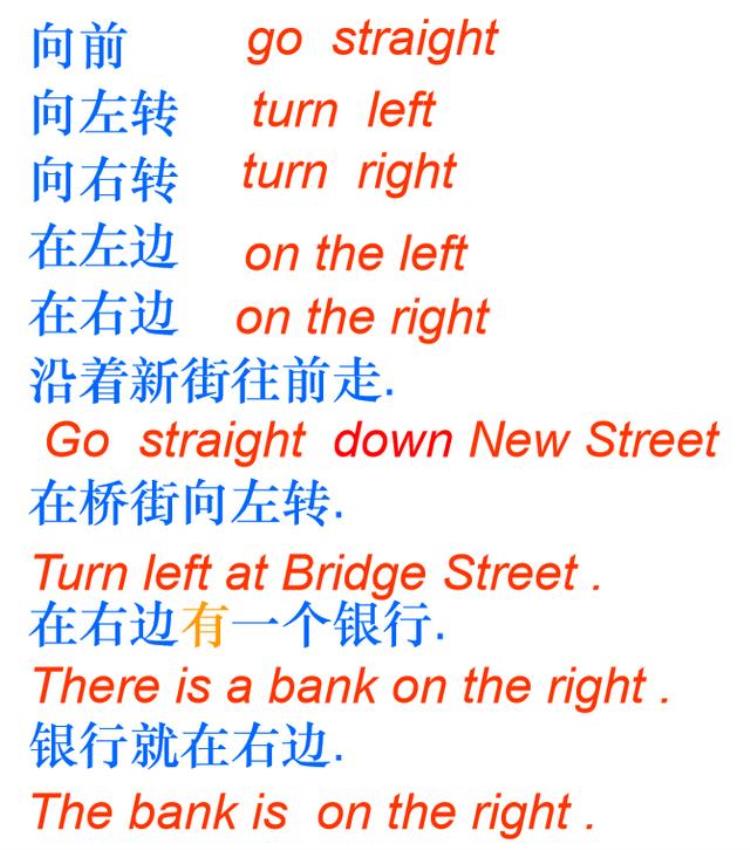
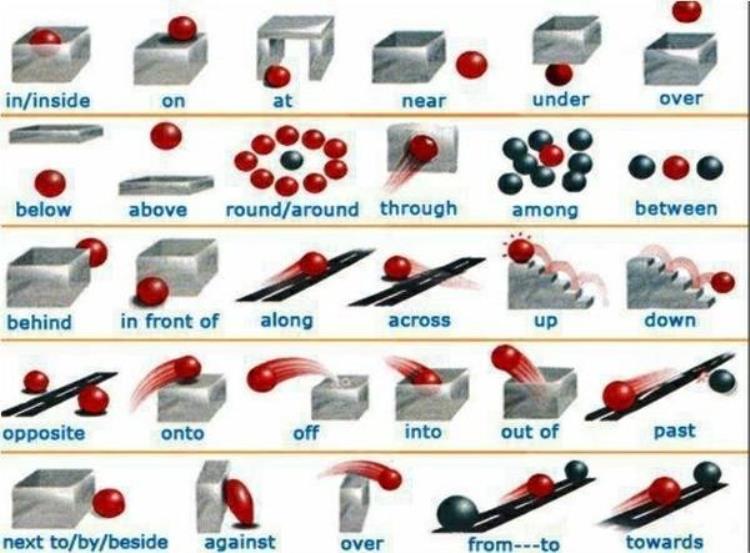
2、问路相关句型:Please tell me where is the bank?/ Excuse me, where is …
Excuse me, can you tell me the way to…?Excuse me, which is the way to…? / How can I get to…?
3、指路相关句型
Walk along the road and turn left / right at…It's opposite / in front of / next to / between…and… / behind… It is on the right / left.Go straight. / Go ahead.
4、练习,用适当的介词填空:
①You can't see the ball. It's ______ the door.
②Shall we meet ________ the gate of the cinema?
③Is he playing _______ the street or ______ the road?
④Are they ________ a factory or _______ a farm?
⑤I sit ________ the twins. The elder sister is _______ my left and the younger one is_______ my right.
⑥The big tree ______ our classroom is nearly 100 years old.
⑦The teacher is writing on the blackboard ______ the classroom.
⑧---- Where is the light? ---- It's just _______ the table.
⑨---- Where are the lamps? ---- They are _____ the desks.
⑩A plane is flying ________ the clouds.
答案:①behind、②at、③in/on;on、④in;on、⑤between;on;on、⑥in front of/behind/beside、⑦in the front of、⑧over、⑨on、⑩above
六、一般过去时
1、概念
一般过去时表示过去某个时间发生的动作或存在的状态,常和表示过去的时间状语连用。一般过去时也表示过去经常或反复发生的动作。
2.Be动词在一般过去时中的变化:
⑴am 和is在一般过去时中变为was。(was not=wasn't)
⑵are在一般过去时中变为were。(were not=weren't)
⑶带有was或were的句子,其否定、疑问的变化和is, am, are一样,即否定句在was或were后加not,一般疑问句把was或were放到句首。
He was good at math. 他曾经数学很好。
3.句中没有be动词的一般过去时的句子
(1)否定句:didn't 动词原形,如:Jim didn't go home yesterday.
(2)一般疑问句:在句首加did,句子中的动词过去式变回原形。
如:Did Jim go home yesterday?
(3)特殊疑问句:
①疑问词 did 主语 动词原形?
如: What did Jim do yesterday?
②疑问词当主语时:疑问词 动词过去式?
如:Who went to home yesterday?
(4)肯定句:主语 动词过去式 其他
I cried.我曾经哭过。
He played football yesterday.他昨天踢足球。
4、动词过去式变化规则:
①一般在动词末尾加-ed,如:pull-pulled, cook-cooked
②结尾是e的单词加d,如:taste-tasted
③末尾只有一个元音字母和一个辅音字母的重读闭音节,应双写末尾的辅音字母,再加-ed,如:stop-stopped
④以"辅音字母 y"结尾的,变y为i,再加-ed,如:study-studied
⑤不规则动词过去式(详见课本后面):am, is-was、are-were,、do-did,、see-saw,、say-said、give-gave、get-got、go-went、come-came、have-had、eat-ate、take-took、run-ran、sing-sang、put-put、make-made、read-read、write-wrote、draw-drew、drink-drank、fly-flew、ride-rode、speak-spoke、sweep-swept、buy-bought、swim-swam、sit-sat、bring—brought、can-could、cut-cut等
5、练习,Be动词的过去时练习
①I _______ at school just now.
②He ________ at the camp last week.
③We ________ students two years ago.
④They ________ on the farm a moment ago.
⑤Yang Ling ________ eleven years old last year.
⑥There ________ an apple on the plate yesterday.
写出下列动词的过去式
isam_____________ fly____________ plant____________ are____________ drink_____________ play___________ go______________ make ________
does_____________ dance__________ worry__________ ask__________ taste_____________ eat____________ draw____________ put ____________
答案:1、was was were were was was
2、was flew planted were drank played went made did danced worried asked tasted ate drew put
七、祈使句
1、概念
祈使句是用来表示请求、命令、劝告、建议等的句子。祈使句的主语通常都是第二人称(you),而且往往被省略。
因此,祈使句一般以动词原形开头。2、祈使句的结构类型
(1)行为动词①肯定祈使句:行为动词 原形Come here, please.请进来Stop talking !别讲话了!Please listen to me !请听我讲!②否定祈使句:Don't 行为动词原形 其他 Don't play football in the street .别在街上踢足球。Don't draw on the wall .别在墙上乱画。
(2)"系动词be 形容词"①肯定祈使句:be 形容词Be quiet ,please !请安静! Be sure call me.一定打电话给我。②否定祈使句:Don't be 形容词。常译为"请别(不要)……"Please don't be late next time ,everyone.同学们,下次别迟到了。Don't be careless(粗心地)when you study.学习时别粗心大意。
(3)动词let型①肯定祈使句:let sb. 动词原形Let Jim help you .让吉姆帮你吧!Let's go home .让我们回家吧!②否定祈使句:L et sb. not 动词原形Let children not smoke.不要让孩子们吸烟。(4)"No 名词复数或动词-ing形式(即动名词)"这种类型的祈使句常用作标志语(sign)或说明,译为"严禁(不准、禁止)做某事"No smoking .不准吸烟。
No swimming.严禁在此处游泳。No parking here.此处严禁停车。
No photos.不准拍照。No pets.不准带宠物。
(5)也可用名词(动名词)、形容词、副词、动词等直接表达。
这种祈使句简洁明快,具有鲜明的口语特色。书写时所有字母都可以用大写形式,也可以只大写首字母。Hands up! 举起手来! Help ! 救命啊!/ 救人啊!
Off the glass ! 勿踏草坪
3、祈使句的答语
对祈使句作答时,常会用will和won't。-Close the door , please.请关门-OK / Yes / Sure ,I will.当然,我会的-Don't be late for school ,Jim !吉姆,上学别迟到啊!-No ,I won't.当然,我不会。
4、练习
①It's an important meeting. ______(not, be )late.
②_______ (not, make) any noise! Your mother is sleeping.
③_______ (not, speak) with your mouth full of food and _____ (be) polite.
④_______( not, talk) and _______ (read) aloud.
⑤_______(not, leave) your homework for tomorrow, Larry.
答案:Don't be、Don't make、Don't speak;be、Don't talk;read、Don't leave
八、感叹句
1、概念
所谓感叹句,就是用来表达喜怒哀乐等强烈感情的句子。感叹句一般由what或how开头,句末加感叹号"!"。What修饰名词,how修饰形容词、副词、动词。The cat is lovely.---How lovely the cat is.---What a lovely cat it is!
2、句型
(1)由What构成的感叹句,what修饰名词或名词短语,有以下两种形式:① What a(an) (形容词) 单数可数名词 主语 谓语!如:What an apple this is!
What a fine day it is! ②What (形容词) 可数名词复数或不可数名词 主语 谓语!What kind women they are! What nice music it is!
(2)由How引导的感叹句, how用来修饰形容词、副词或动词
其结构是:How 形容词(副词) 主语 谓语!
How hard the worker are working!
How clever the girl is! How quickly the boy is writing!
注意:当how修饰动词时,动词不跟着感叹词提到主语之前。
How the runner runs!
3、感叹what和感叹句how的区别
(1)"what"意为"多么",用作定语,修饰后面的名词(被强调部分,该名词前常有形容词修饰语)单数可数名词前要加不定冠词a/an;复数可数名词或不可数名词前不用冠词。(2)"how"意为"多么",用作状语,修饰形容词或副词(被强调部分)。如果how修饰形容词,则句中的谓语动词用系动词;如果how修饰副词,则句中的谓语动词用行为动词。
(3)注意
在感叹句的主语前若还有名词存在时,用What来引导;在感叹句的主语前若无名词时,则用How来引导。 What a clever girl she is! 多么聪明的姑娘呀!
What good children they are! 他们是多么好的孩子呀! How cold it is today! 今天多么冷呀! How happy they look! 他们显得多么高兴呀! 但在"How 形容词 a / an 名词单数 主谓!"中不可用What,因为此句中强调了形容词。 How naughty a boy your brother is!
4、练习,用what或how填空
① ________ a big tree it is! ②________ big the tree is!③________ beautiful pictures!④ ________ beautiful the pictures are!⑤ ________ high the building is!⑥_______ big eyes she has!⑦________ lovely the ice-cream is!⑧ ________ lovely ice-cream!
答案:what、how、what、how、how、what、how、what
九、选择疑问句
1、概念
选择疑问句表示提供两种或两种以上的情况,要求对方在所提供的范围、对象内选择。在所提供的最后一个备选对象前面用表示选择关系的并列连词or(或者),朗读时or前用声调,or 后面用降调,句末用问号。
2、选择疑问句的结构
(1)、"一般疑问句 or 另一个备选对象"。例如:
Shall we go there by bus, bike or train?
我们乘公共汽车、自行车还是火车去?(备选对象为三者)
Would you like some tea or coffee?
你要茶水还是咖啡? (备选对象为二者)
Did you stay at home or at school yesterday?
你昨天呆在家还是在学校?(备选对象为二者)
(2)"特殊疑问句 or 另一个备选对象"。例如:
Which would you like best, English, Chinese or Math?
你最喜欢哪门学科,英语、语文还是数学?
When will you go to Canada, Sunday or Monday?
你何时去加拿大,星期天还是星期一?
3、选择疑问句的回答
回答选择疑问句时,一般在所提供的备选对象范围内选择,有时也要视具体情况作灵活处理,但是不能用Yes / No来回答,一般用一个完整的陈述句或其简略形式,主语和谓语均省略。
近年来的考试趋势逐渐使用一个关键词,即不定代词作简略回答。
(1)、从备选对象中选择其中某一项回答。
─ Are you going to borrow a dictionary or a magazine?
─ ____. (2005年江苏南通)
A. Yes, a dictionary B. No, a magazine C. A magazine D. Yes, both
分析:选项A, B, D不能回答选择疑问句。选项C是从备选对象中选择了其中的一项来回答的,符合语境。
(2)、选对象是二者,可任选其一就用表示肯定的either;两个对象都选就用表示肯定的both;两个对象都不选就用表示否定的neither。
─Would you like chicken noodles or beef noodles?
─____. I'd like tomato noodles. (2008年宁波)
A. Either B. Neither C. Both D. None
分析:备选对象是二者,先排除D。由回答可知,要否定上面提供的备选对象。而A和C不符合逻辑,故选B。
(3)如果备选对象是三者,可任选其一时,就用one of them(他〈它、她〉们中任意之一);三个对象都选就用all;三个对象都不选就用none。
─Which do you like best, coffee, water or juice?
─_____. I only like tea.
A. Both B. Either C. Neither D. None
分析:备选对象是三者,排除A, B, C。选择D选项,意为"咖啡、水和果汁都不喜欢。我只喜欢茶水。"
4、练习
①─What would like, milk or coffee? ─___. Just a cup of tea.
A. Both B. Either C. Neither D. None
②—Which do you like better, skating or skiing?
─_____ of them. I like running.
A. All B. Both C. Either D. Neither
③─Do you want tea or coffee?
─____. I really don't mind.
A. Both B. None C. Either D. Neither
④─Do you like the pop star Zhou Jielun or the move star Liu Dehua?
─____. I am not their fan.
A. Both B. Either C. Neither D. All
⑤─Which do you prefer, bananas or oranges?
─____. I enjoy eating apples.
A. Both B. Either C. Neither D. All
答案:CDCCD
特别声明:所有资讯或言论仅代表发布者个人意见,直播谷仅提供发布平台,信息内容请自行判断。
-
 最近因为课时规划,刚好在做下册知识总结,分享给有需要的学生们,假期除了适当娱乐休息,也是充电提升自我的好机会哦!加油! 外研版英语初一下册语法知识总结 一、物... (查看全文)2023-03-08 | 阅读:241次
最近因为课时规划,刚好在做下册知识总结,分享给有需要的学生们,假期除了适当娱乐休息,也是充电提升自我的好机会哦!加油! 外研版英语初一下册语法知识总结 一、物... (查看全文)2023-03-08 | 阅读:241次
- 特别声明:本站所有直播和视频均来自互联网,本站不从事任何经营业务 备案号:沪ICP备2024046980号版权删除:malanshan380@163.com 合作@huzhan6688










